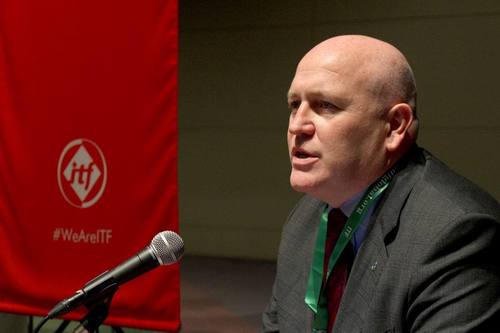ÐÎÑÑÈÉÑÊÈÉ ÏÐÎÔÅÑÑÈÎÍÀËÜÍÛÉ ÑÎÞÇ ÌÎÐßÊÎÂ
SEAFARERS' UNION OF RUSSIA
A NON-UNIONIZED SEAFARER
IS AN UNPROTECTED SEAFARER
Back
Unions and shipowners set for September wage showdown

Crew hardship and employers' billion-dollar profits have given unions plenty of ammunition ahead of potentially fractious negotiations.
Shipping’s leading maritime employers and the International Transport Workers’ Federation (ITF) are set to meet in London in the first week of September to review the industry's largest collective bargaining agreement.
The meeting could be fractious, with unions ready to play hardball against a backdrop of liner companies making multibillion US-dollar profits, and the struggles of seafarers during the pandemic.
The International Bargaining Forum (IBF)'s collective bargaining employment contract plays an important part in influencing employment standards.
It is the dominant collective bargaining agreement in shipping, and sets a benchmark for wage and employment conditions.
It constitutes more than 70% of ITF wage agreements and covers close to 10,000 ships.
The current four-year agreement expires in December 2022, but a clause for a midway review of wages, death and disability and welfare fund rebates in Singapore in March 2020 has been continually postponed by the pandemic.
The International Maritime Employers' Council (IMEC) and the ITF will meet at ITF House in London.
Other members of the employers’ Joint Negotiating Group (JNG), including the International Mariners Management Association of Japan, Korean Shipowners' Association and Evergreen Marine, look likely to participate via Zoom.
Far from amicable
Unions and employers fell out over minimum wage guidelines for ratings at the International Labour Organization (ILO) in April.
The ITF called for a 10% rise in minimum-wage guidelines and walked away from a 3% offer from shipowners. Negotiating representative Mark Dickinson said shipowners had shown their “true colours” by offering a small increase, despite professing to support seafarers during the pandemic crew crisis.
Shipowners said that the ITF had effectively left seafarers stranded without a deal for two more years just to score publicity points, with an eye on the upcoming IBF talks.
Miles apart
“The ITF and IMEC have worked closely together on the crew crisis and seafarer vaccination but it was clear to see at the ILO they are miles apart on employment terms,” commented a ship manager. The union has not disclosed its target wage rise but, judging by previous negotiations, it could reach double figures. The ITF is still smarting after only achieving a 2.5% rise in the current deal when it was agreed in 2018. But the ITF won a victory in the talks by securing a dockers clause, which excluded seafarers from lashing work.
The hardship suffered and sacrifices made by many hundreds of thousands of seafarers — who in many cases have spent more than a year at sea away from home — will give the ITF a strong hand. There are also an equal amount of its members who have suffered financial hardship because they have not been able to join ships. The talks come as liner company operators, and more recently bulker operators, report eye-watering profits.
Japanese-controlled liner operator Ocean Network Express said it expected a post-tax profit of $6bn in the first half of its fiscal year. AP Moller-Maersk this week said it is expecting Ebitda of between $18bn and $19.5bn for the full year, lifting it from $13bn to $15bn previously.
The shipowners will argue that the headline profits are far from representative of the industry as a whole and many shipping sectors have seen earnings hit and operating costs increase during the pandemic.
Source: tradewindsnews.com
International Transport Workers’ Federation general secretary Stephen Cotton said the right of seafarers to return home must be respected.P hoto: ITF
Up
